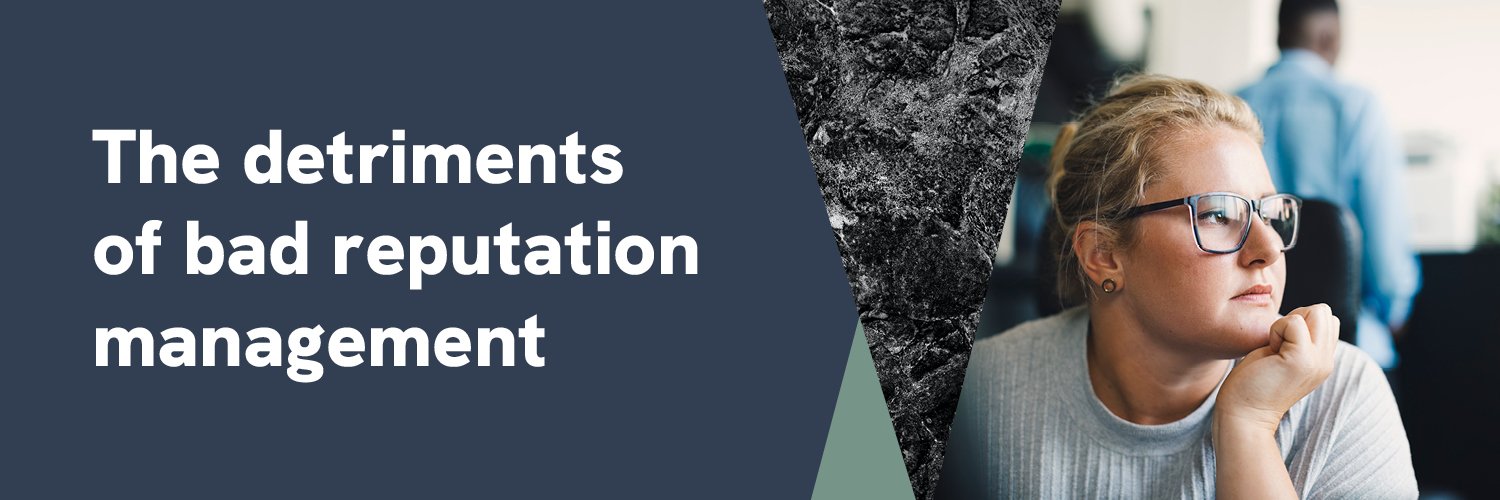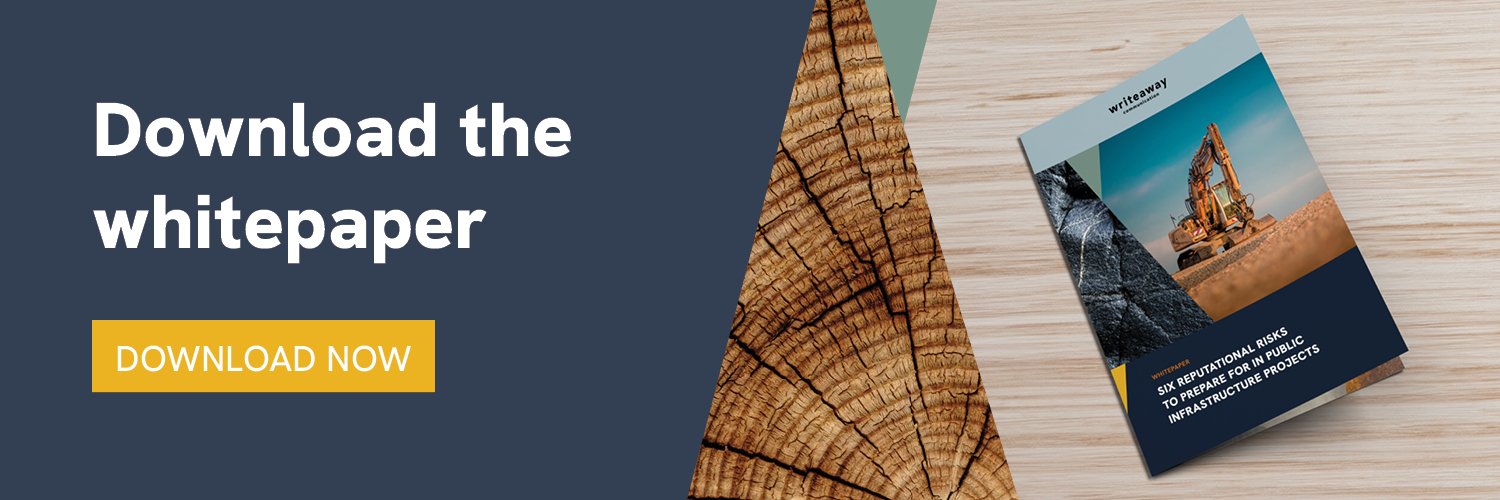Length: 6-minute read
Quick Summary: Good reputation management helps you maintain a positive brand and business image in the media, industry, and with your broader customer base. However, with great reward, comes great risk, and working on public infrastructure projects could cause damage to your reputation. Learn the pitfalls you need to avoid and how reputation management is key to securing enduring success.
The benefits of good reputation management

A successful business with a good brand reputation is likely to enjoy multiple benefits. Your good reputation will bring positive reinforcement from media, industry insiders, and customers, helping to secure you more sales and partnership opportunities, often through word-of-mouth and networking. However, a poor business reputation will likely show you the other side of the coin, marked by missed opportunities.
Your reputation is a key part of your business success, and it’s important that you take steps to protect it and mitigate any potential risks that could damage it. A good reputation takes time, energy, and resources to build. However, it’s crucial to recognise that, once you have it, the smallest error or event could topple you from your pedestal.
Good reputation management helps you maintain a positive brand and business image in the media, industry, and with your broader customer base. However, to build and maintain a good brand reputation, it’s important to understand the risks that could lead you to lose your good standing, and the steps you can take to avoid common pitfalls.
Businesses in the built environment work with customers across numerous projects and industries, including the government. The same as with private sector entities, good reputation management can help businesses win tenders with public organisations, which can be crucial to demonstrating success in the built environment industry.
However, when it comes to working on public infrastructure projects, the fall from grace can be significant and swift. Factors such as bad weather, debt non-payments, supply delays, workplace accidents, changing regulations, or union activism can introduce risk, all of which are rife in public sector infrastructure projects.
A bad reputation closes doors to new opportunities

Navigating sizeable public infrastructure projects is more complex than ever before. The logistics involved include coordinating the project’s competing priorities, and there are increasing demands around transparency, accountability, innovation, cost, and speed and efficiency.
While technical delivery can define the success of a project, it’s important to recognise that a significant proportion of the project’s value is generated through intangible assets such as brand equity or intellectual capital. This means that growing or maintaining a strong reputation among stakeholders and communities can ultimately be the defining point of the project and organisation, making reputation management a critical element of overall risk management.
Without proper risk and reputation management, or a comprehensive communications strategy, small issues can escalate into large-scale, visible problems that could result in long-term reputation damage. And, once your reputation is impacted, it can have both tangible and intangible ramifications for the business. These can include:
-
- Increased unplanned costs: a damaged reputation can increase unplanned costs, such as increases in daily operational costs due to changed ways of working, costs associated with delayed project delivery, or even regulatory fines.
- Reduced funding access: a diminished organisational reputation can complicate access funding by colouring your perceived competence, integrity, and trustworthiness, which can affect investors as well as other sources of funding.
- Loss of staff: reputational damage to an infrastructure project or organisation can have a domino effect for other stakeholders, including employees and subcontractors withdrawing from the project as a form of personal damage control. These personnel losses can create further delays and compound existing reputational damage.
- Future business losses: entire businesses can be undermined by reputational damage, as it can reduce the likelihood of winning future tenders and could even result in purposeful exclusions from other opportunities. In fact, after one specific negative reputation event, one organisation reportedly experienced a 41 per cent loss of revenue and a 41 per cent loss in brand value.1
- Loss of social capital: beyond revenue or financial capital losses, a damaged reputation can also lead to a loss of social capital, particularly with partner organisations such as suppliers or government, due in part to perceived losses of trust and value. Consequently, it may be difficult to secure future contracts with these organisations.
- Greater regulatory scrutiny: once your reputation is damaged, it opens the door to greater scrutiny of business processes and operations from regulatory authorities. Complying with increased scrutiny can add extra costs and pressure to the organisation.
Why managing your reputation should be part of your communications strategy

An average of 25 per cent of a company’s value is directly attributed to its reputation,2 so it’s crucial to focus on reputation management to ensure stability, profitability, and sustainability for your business and its involvement in public infrastructure projects. Consequently, brand reputation and crisis management must be a key consideration in your communications strategy.
This should take a two-fold approach. On one hand, it’s important to invest in ongoing public relations (PR) and marketing activities to build your reputation in the media and wider industry through published case studies, customer and spokesperson media interviews, thought leadership content, social media engagement, and broader marketing collateral. This ongoing activity will help to strengthen your position in the marketplace, helping you to secure share of voice and put you in front of the people that matter: your prospective customers. Working with a specialist, integrated communications agency with demonstrated experience in the built environment can help you make the most of your media and marketing opportunities and put your best foot forward.
Once you build your reputation up, there’s a risk of it crumbling. In this case, it’s important to have an experienced communications agency in your corner that can support you with crisis communication and support your business through any events that could cause reputational damage.
How a communications agency is a crucial partner to manage your reputation

Maintaining a positive reputation translates to value, so reputation must be a crucial element of your risk management strategy, especially as, once your reputation has been damaged, it can have negative implications for everyone involved.
It’s important for your brand strategy to include engagement with a PR agency. Having a team of dedicated communications specialists in your pocket when times are tough is as essential as having them there when you’re building your reputation. For the best results, it’s crucial to work with an integrated communications agency that can help you build, and rebuild, your reputation as you need to. To learn more about how your reputation can be damaged when working on a public infrastructure project, and how to mitigate the risk, download the whitepaper.
Write Away Communication—part of The Recognition group, Australia’s leading group of PR and marketing specialists—has more than 35 years of experience working with businesses involved in all aspects of the built environment, helping them to simplify their messaging and connect with the right audiences, as well as delivering issues, crisis, and reputation management support. For more information on how Write Away Communication can help you build and maintain a good reputation, contact the team today.











